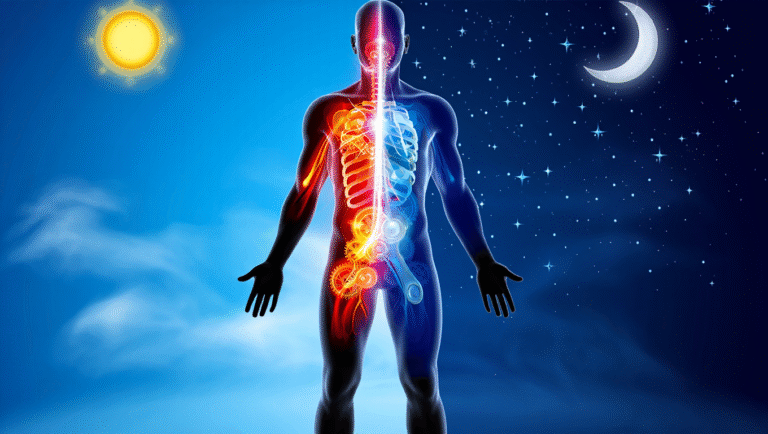How Circadian Rhythms Impact Your Health and Well-being?
Are you experiencing any of these signs?
The human body operates on a complex network of internal clocks called circadian rhythms, regulating everything from sleep patterns to hormone levels, influencing health, performance, and overall well-being.

As the sun rises and sets, our bodies synchronise with these rhythms, performing different biological functions throughout the day.
Understanding circadian rhythms:
Circadian rhythms are our body’s internal clocks, orchestrating various physiological processes over a 24-hour cycle. Derived from Latin words meaning “around” and “day,” these rhythms ensure our bodies align with natural light and darkness cycles. While sleep-wake cycles are the most well-known, circadian rhythms extend to nearly all bodily functions, including temperature regulation, hormone secretion, digestion, and cognitive function.
Factors affecting circadian rhythms:
- Disrupted sleep patterns, like late bedtimes or sleep disruptions from sleep disorders, can lead to insufficient sleep and misaligned circadian rhythms.
- Exposure to artificial light at night, especially from electronic devices, can confuse internal clocks, disrupting sleep-wake cycles and contributing to sleep problems.
- Jet lag from rapid time zone travel results in sleep disturbances and fatigue as internal clocks adjust to new time zones.
- Shift work disrupts natural sleep patterns, causing irregular sleep schedules and circadian rhythm disturbances.
- Busy schedules and constant connectivity can lead to deviations from natural circadian rhythms.
- Irregular meal timing, late-night eating, and food choices, like high-fat or high-sugar diets, can disrupt internal clocks and lead to sleep disturbances.

Factors affecting circadian rhythms:
- Disrupted circadian rhythms can lead to various health issues, including:
- Sleep disorders like insomnia and poor sleep quality
- Fatigue and reduced cognitive function
- Mood swings, irritability, depression, and anxiety
- Metabolic disorders such as obesity and diabetes
- Weakened immune system and increased susceptibility to infections
- Cardiovascular problems like high blood pressure and heart risks
- Digestive issues including irregular bowel movements and reflux
- Hormonal changes and reduced ability to cope with stress.

Circadian rhythm throughout the day:
- Morning (around 6 am – 9 am): Cortisol surges, body temperature rises, heart rate increases, and melatonin levels decline.
- Late morning (around 9 am – 12 pm): Peak alertness and increased digestive activity.
- Afternoon (around 12 pm – 3 pm): Ideal time for lunch, followed by a post-lunch dip in alertness.
- Early evening (around 5 pm – 7 pm): Body temperature begins to drop, signalling preparation for sleep, and melatonin production starts.
- Late evening (around 9 pm – 11 pm): Melatonin release increases, promoting sleep onset.
